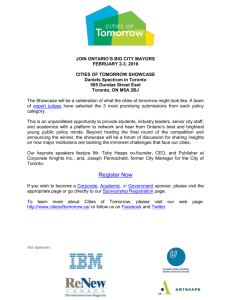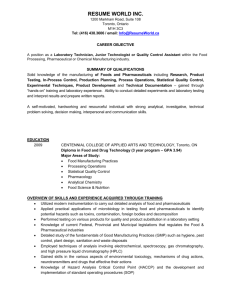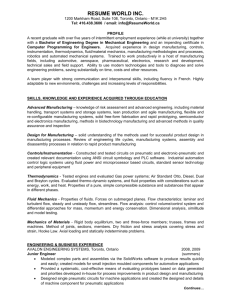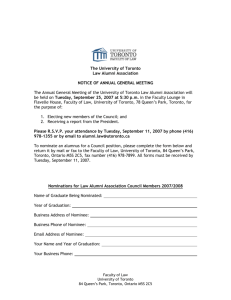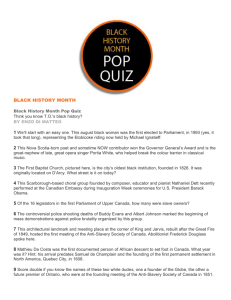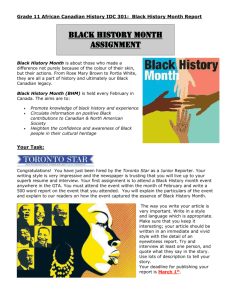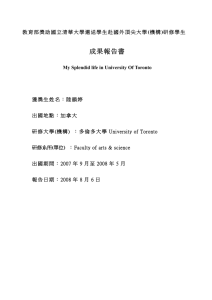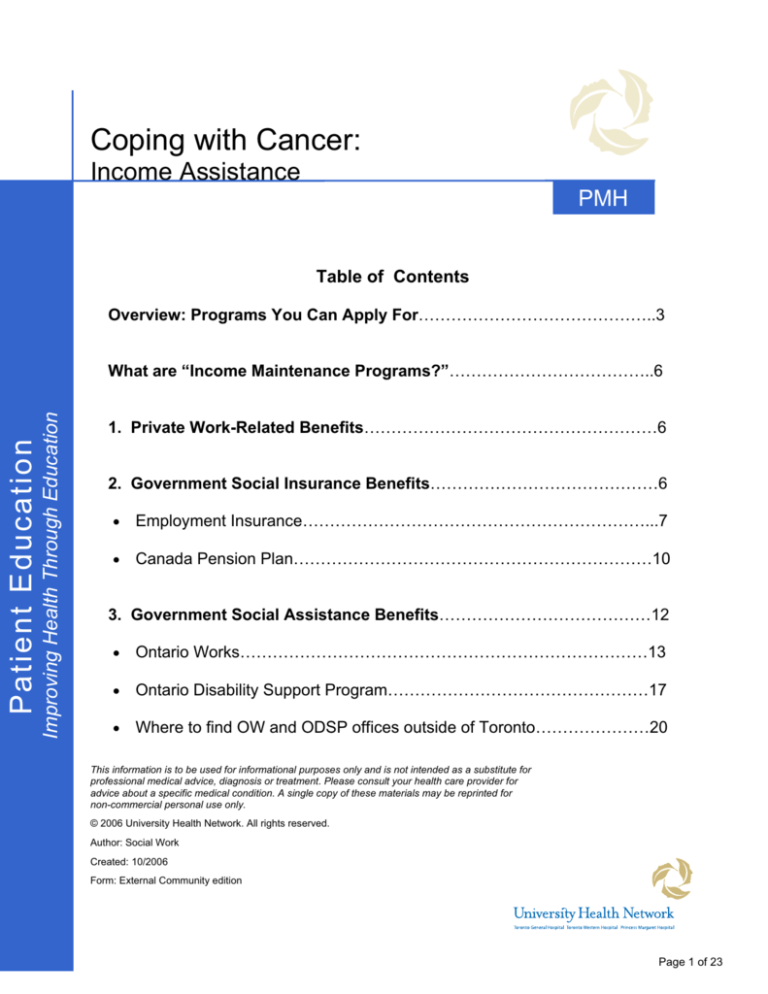
Coping with Cancer:
Income Assistance
PMH
Table of Contents
Table of Contents
Overview: Programs You Can Apply For……………………………………..3
Improving Health Through Education
Patient Education
What are “Income Maintenance Programs?”………………………………..6
1. Private Work-Related Benefits………………………………………………6
2. Government Social Insurance Benefits……………………………………6
x Employment Insurance………………………………………………………...7
x Canada Pension Plan…………………………………………………………10
3. Government Social Assistance Benefits…………………………………12
x Ontario Works…………………………………………………………………13
x Ontario Disability Support Program…………………………………………17
x Where to find OW and ODSP offices outside of Toronto…………………20
This information is to be used for informational purposes only and is not intended as a substitute for
professional medical advice, diagnosis or treatment. Please consult your health care provider for
advice about a specific medical condition. A single copy of these materials may be reprinted for
non-commercial personal use only.
© 2006 University Health Network. All rights reserved.
Author: Social Work
Created: 10/2006
Form: External Community edition
Page 1 of 23
© 2006 University Health Network. All rights reserved.
Short-Term or
Long-Term
Disability
© 2006 University Health Network. All rights reserved.
Apply through workplace
Personnel/Human Resources
Department
Sick Pay
Private Work-Related Benefits
Canada Pension
Plan - Long Term
Disability
Apply through local Human
Resources Development Canada
office
Employment
Insurance – Sick
Benefits
Government Social Insurance Benefits
Ontario
Disability
Support
Program
Apply through local
Ministry of Community,
Family & Children’s
Services office
Apply through local
Municipal Social Services
Ontario Works
Government Social Assistance
Benefits
Overview of Income Assistance Programs Available to Patients
Overview: Programs
You Can Apply For
1. Private Work-Related Benefits
What are they?
These benefits are part of workplace
insurance plans. They are not run by the
government. If you work and your employer
has a plan, you have probably been paying
into the plan (see page 6 of this booklet for
more details).
Who are they for?
These benefits are for people who have
paid into insurance plans through their
workplace.
What kinds are there?
- Sick Pay (covers all or only part of your
regular pay)
- Short Term Disability Pay
- Long Term Disability Pay
How do I apply?
You apply through the Personnel or Human
Resources Department at your workplace.
2. Government Social Insurance Benefits
What are they?
These benefits are run by the federal
government. The money comes from
contributions people make automatically
through their workplace. If you work, you have
probably paid into these government social
insurance programs.
© 2006 University Health Network. All rights reserved.
Page 4 of 23
Who are they for?
These benefits are for people who have
paid enough into government social
insurance plans through their workplace or
as a self-employed person (for example
CPP).
What kinds are there?
Employment Insurance: This is a short-term
sick benefit that you can get for up to 15
weeks (see page 6 of this booklet for more
details).
Canada Pension Plan - Long Term
Disability: The amount you can get is based
on the contributions you have made (see
page 10 of this booklet for more details).
How do I apply?
You apply through your local Human
Resources Development Canada office.
There is a list of these offices in Toronto on
pages 9 and 10 of this booklet.
3. Government Social Assistance Benefits
What are they?
Social assistance is different from social
insurance. First, it’s run by the provincial
government. Second, you don’t need to have
paid into this program through workplace
contributions in order to get benefits. The
money for the program comes from taxes (see
page12 of this booklet for more details).
Who are they for?
These benefits are for people who have no
income, low incomes, no assets and/or low
amount of assets (property).
What kinds are there?
Ontario Works: Emergency/Short-Term
Financial Assistance.
© 2006 University Health Network. All rights reserved.
Page 5 of 23
Ontario Disability Support Program: Longterm assistance for people who can’t work
because of an illness.
How do I apply?
You apply for Ontario Works through your
local Municipal Services office. Please see
page 13 of this guide to find your local office.
You can call the Intake Line directly and they
will help you apply.
You apply for Ontario Disability Support
Program through your local Ministry of
Community, Family & Children’s Services
office. Please see page 18 of this guide to find
your local office. You can call the Intake Line
directly and they will help you apply.
What Are “Income Maintenance Programs”?
All of the programs described in this booklet are “income maintenance
programs”. The financial help they provide meets only basic needs. This
means that the benefits you get will probably be less than your present
income.
If you can’t work because of your illness, consider these programs in the
following order:
1. Private Work-Related Benefits
2. Government Social Insurance Benefits
3. Government Social Assistance Benefits
1. Private Work-Related Benefits
If you have a workplace insurance plan, you might be able to get Sick Pay or
Disability Pay (short term or long term) through the plan.
You should know that:
x The benefits you can get will depend on the plan your employer
has. Different employers have different plans. Talk to the
Personnel or Human Resources Department at your workplace to
© 2006 University Health Network. All rights reserved.
Page 6 of 23
see what you can apply for. If you are self-employed, you may
still be eligible for CPP.
x These plans usually offer different kinds of help. The help might be
short term or long term. It might be the same as your regular pay
(full pay) or cover only part of it (partial pay).
2. Government Social Insurance Benefits
If you paid into these federal social insurance programs through your
workplace, you can apply for benefits from these programs.
Employment Insurance (EI) – Sick Benefits
Human Resource Development Canada
Employment & Insurance Division
1-800-206-7218
http://www.hrdc-drhc.gc.ca/isp
To qualify for Sick Benefits under EI:
x You must have worked at least 700 hours in the last 52 weeks.
x The hours you worked must have been “insurable employment.”
This means that you were paying into the EI plan through your
employer.
x Apply for these Sick Benefits as soon as you stop working. If
you are too sick to apply right away, contact your local Human
Resources Development Canada office. (They might be able to
backdate your application to the time that you stopped working.)
What you get:
x 55% of your average weekly earnings, before you got sick. Right
now the maximum you can get each week is $413.
x You can only get these Sick Benefits for 15 weeks.
x There is a waiting period of 2 weeks after you apply. You don’t get
any benefits during these 2 weeks. You will be paid for 15 weeks
after this waiting period.
© 2006 University Health Network. All rights reserved.
Page 7 of 23
How to apply:
x Contact your nearest Human Resource Development Canada
(HRDC) Centre to apply. We have listed the office locations on
page 8 of this booklet.
x or you can apply for EI Sick Benefits on the internet. Go to
http://www.hrdc-drhc.gc.ca/isp
x Along with your application, you will need to send in a Record of
Employment from your employer. Send in these forms right away-as soon as you have stopped working.
x You will also need to send in a completed medical certificate
form from your doctor that says how long your illness is expected
to last. You will find this form with the application package.
x Applications can take 6 weeks to be processed.
x Making your claimant’s reports:
-
A claimant’s report is a statement from you telling EI that
you either have or have not worked during a two-week
period..
-
After you apply for Sick Benefits, you will get a notice in the
mail telling you when your first claimant’s report is due.
-
You will be able to give these reports over the telephone
using a personal Telephone Access Code (TAC) that you’ll
be given.
-
Every time you call to give your claimant’s reports or to ask
about your claim, you will need this code. You will also need
your Social Insurance Number (SIN).
-
If you do not want to make your reports by phone, you have
to ask for permission to mail them in. To do this you need to
speak to an EI representative either by telephone or in
person at your nearest HRDC office.
© 2006 University Health Network. All rights reserved.
Page 8 of 23
Human Resources Development Canada (HRDC) Office Locations in
Toronto:
These are Toronto area offices. If you live outside Toronto, look in the blue
pages of your phone book for the office nearest you.
The offices serve different postal code areas. Find the office nearest you by
looking for the first 3 digits of your postal code in this list:
HRDC Office:
Postal codes that this office serves:
Danforth
811 Danforth Ave.
Toronto M4J 5A8
416-461-3511
Monday-Friday 8:30-4:00
M1K, M1L, M1N, M1R, M4B, M4C, M4E, M4J,
M4K, M4L, M4M
Etobicoke
Dundas-Kipling Centre
5343 Dundas St West Station 200
Etobicoke M9B 6K6
416-954-1500
Monday-Friday 8:30-4:00
M8V, M8W, M8X, M8Y, M8Z, M9A, M9B,
M9C, M9P, M9R, M9V, M9W
Lakeside
900 Dufferin St.
Toronto M6H 4A9
416-583-4700
Monday-Friday 8:30-4:00
M6G, M6H, M6J, M6K, M6N, M6P, M6R, M6S
Lawrence Square
700 Lawrence Ave. West #103-105
Toronto M6A 4L4
416-780-4100
Monday-Friday 9:00-4:30
M6A, M6B, M6C, M6E, M6G, M6H, M6L, M6M,
M9N
© 2006 University Health Network. All rights reserved.
Page 9 of 23
Scarborough
200 Town Centre Court, Suite 220
Scarborough M1P 4X9
416-973-4400
Monday-Friday 9:00-4:30
M1A, M1B, M1C, M1E, M1G, M1H, M1J,
M1K, M1M, M1P, M1S, M1T, M1V, M1W,
M1X
Toronto Centre
25 St Clair Ave East 1st Floor
Toronto M4T 1M2
416-973-6915
Monday-Friday 8:30-4:00
M2L, M2P, M3A, M3B, M3C, M4A, M4G, M4H,
M4N, M4P, M4R, M4S, M4T, M4V, M4W, M4X,
M4Y, M5A, M5B, M5C, M5E, M5G, M5H, M5J,
M5K, M5L, M5M, M5N, M5P, M5R, M5S, M5T,
M5V, M5W, M5X
Toronto North
3737 Chesswood Dr.
Downsview ON M3J 2P6
416-954-8700
Monday-Friday 8:30-4:00
M2H, M2J, M2K, M2M, M2N, M2R, M3H, M3J,
M3K, M3L, M3M, M3N, M9L, M9M
Canada Pension Plan (CPP) – Disability Benefits
Human Resources Development Canada
Income Security Programs
1-800-277-9914
http://www.hrdc-drhc.gc.ca/isp
To qualify for Disability Benefits through the CPP:
You must have a severe and prolonged illness. “Severe” means that you can’t
work. “Prolonged” means that you can’t work for at least one year.
x You must have worked 4 out of the last 6 years.
x You if you are self-employed, or your employer, must have made
contributions to the CPP while you were working.
x You must be under 65 years of age. If you are 65 or more, you get the CPP
Retirement Pension instead.
© 2006 University Health Network. All rights reserved.
Page 10 of 23
What you get:
x The amount of you get depends on how much you contributed to
the CPP while you were working. There is a maximum amount
that you can receive.
x You also get an allowance for every child you have who is still
financially dependent on you.
x The payments start 4 months after the date that you were unable
to continue working.
x CPP payments can change every January. January is the month
when the Consumer Price Index measures whether the cost of
living has increased.
How to apply:
x Call 1-800-277-9914 to ask for an application package or pick up
an application at the Princess Margaret Hospital, Psychosocial
Oncology and Palliative Care, 16th floor, room 718.
x Fill out the application. If you can’t, have a representative who can
act on your behalf do it for you.
x Your doctor has to fill out Section B of the Medical Report. This is
part of the application package.
x Along with your application, you will need to send in a copy of your
original birth certificate or baptismal certificate. The certificate will
be given back to you. If you want to send a photocopy instead of
the original, you have to have the photocopy certified as a “true
copy.” A social worker in the Psychosocial Oncology and Palliative
Care Program at the Princess Margaret Hospital can help you with
this. Please call (416) 946-4525 for assistance.
x Take or mail your application package to the nearest Client
Service Centre. Call 1-800-277-9914 to find out where your
nearest Centre is. If you are in Toronto, see below for the address.
© 2006 University Health Network. All rights reserved.
Page 11 of 23
Office Locations:
Call 1-800-277-9914 to find out which Centre you should take or mail your
application package to.
The following office is for the Toronto area. If you live outside Toronto, look in
the blue pages of your phone book under Human Resources Development
Canada, Income Security Programs for the centre nearest you or call 1-800277-9914.
CPP – Disability Applications
Income Security Programs
P.O. Box 5100, Station D
Scarborough, ON M1R 5C8
3. Government Social Assistance Benefits
Ontario Works (OW)
Ministry of Community, Family and Children’s Services Office
416-325-5666
Toll free 1-888-789-7499
http://www.cfcs.gov.on.ca/CFCS/en/programs/IES/default.htm
To qualify for Ontario Works:
x Ontario Works helps people from 16 years of age (employed or
attending school) to those aged 18 and over who have no income
or very little income and limited assets
x For youth ages 16-17 who are living at home with their parent(s),
Ontario Works will review the entire financial circumstances of the
family to determine if the youth will qualify
What you get:
x financial help right away, but only for the short-term. The help you
get is only temporary. Ontario Works might meet your needs while
you are waiting for help from another government program (EI,
CPP, or ODSP).
© 2006 University Health Network. All rights reserved.
Page 12 of 23
x Special Assistance, if you qualify for Special Needs. (This is
money for things related to your illness like a special diet, dental
bills, transportation, medical supplies, or wigs).
x a drug benefit card. You might be able to get a card that you can
use at the pharmacy to pay for your prescription drugs.
How to apply:
x Make an appointment at your closest Ministry of Community,
Family and Children’s Services Office (the office locations are
listed on the next page). If you are too sick to go to an
appointment, you can ask to have one in your home.
x They will ask you about your income, savings, assets (property)
and expenses.
x Bring to your appointment:
1. personal identification (all of these):
- your birth certificate or proof of citizenship or landed
immigrant status
- your Social Insurance Number card
- your OHIP health card
2. proof of what you pay for housing
- for example, a copy your copy of lease or some rent
receipts
3. proof of your income
4. proof of your assets (what you own)
- bank book updates for the last 3 months
- life insurance policies
- any investments
5. a pay stub from your last employer, if possible
© 2006 University Health Network. All rights reserved.
Page 13 of 23
Ontario Works Offices in Toronto
These are the Toronto offices. If you live outside Toronto, look in the blue pages
of your phone book for the office nearest you.
The offices serve different postal areas. Find the office nearest you by looking for
the first 3 digits of your postal code in this list:
Ontario Works Office:
Postal codes that this office serves:
Central Toronto
150 Eglinton Ave East Suite 900
Toronto M4P 3E2
416-397-1800
Intake: 416-397-5100
Monday-Friday 8:30-4:30
M4P, M4R, M4S, M4T, M4V, M5N, M5P,
M6B, M6C, M6E, M6H
Downtown Toronto
111 Wellesley Street East
Toronto M4Y 3A7
416-392-5300
Intake: 416-392-5100
Monday-Friday 8:30-4:30
M4K, M4W, M4X, M4Y, M5A, M5S, M5R
East Toronto
1631 Queen St E
Toronto M4L 1G4
416-392-3200
Intake: 416-392-3213
Monday-Friday 8:30-4:30
M4E, M4J, M4L, M4M
East York
1450 O’Connor Dr # 33
Toronto M4B 2T8
416-392-3400
Intake: 416-392-3421
Monday-Friday 8:30-4:30
M3C, M4A, M4B, M4C, M4G, M4H, M4K, M1L
Etobicoke North
220 Attwell Dr # 4
M9R, M9V, M9W
© 2006 University Health Network. All rights reserved.
Page 14 of 23
Etobicoke M9W 6T9
416-392-6400
Intake: 416-392-6405
Monday-Friday 8:30-4:30
Etobicoke South
779 The Queensway
Etobicoke M8Z 1N4
416-392-6550
Intake: 416-397-0330
Monday-Friday 8:30-4:30
M8V, M8W, M8X, M8Y, M8Z, M9A, M9B, M9C,
M9P
High Park/Parkdale
1900 Dundas St W
Toronto M6R 3B6
416-397-7800
Intake: 416-397-7900
Monday-Friday 8:30-4:30
M6J, M6K, M6R, M6S
Metro Hall
214 Wellington St W
Toronto M5V 3C6
416-392-2600
Intake: 41-392-2635
Monday-Friday 8:30-4:30
M5B, M5C, M5E, M5G, M5H, M5J, M5K, M5L,
M5S, M5T, M5V, M5W, M5X, M6G
North York Central
1117 Finch Ave W
North York M3J 2P7
416-397-9450
Intake: 416-397-9451
Monday-Friday 8:30-4:30
M3H, M3J, M3K, M3M, M6A, M6L
North York East
20 LesMill Road
North York M3B 2T5
416-392-2850
Intake: 416-392-2811
Monday-Friday 8:30-4:30
M2H, M2J, M2K, M2L, M2M, M2N, M2P, M2R,
M3A, M3B, M4N, M5M
© 2006 University Health Network. All rights reserved.
Page 15 of 23
North York West
1860 Wilson Avenue
North York M9M 3A7
416-392-6500
Intake: 416-397-0185
Monday-Friday 8:30-4:30
M3L, M3N, M9L, M9M, M9N
Scarborough North
5639 Finch Ave E
Scarborough M1B 5L1
416-397-1000
Intake: 416-397-1010
Monday-Friday 8:30-4:30
M1B, M1C, M1E, M1G, M1H, M1M, M1N, M1S,
M1T, M1V, M1W, M1X
Scarborough West
1225 Kennedy Rd U# F
Scarborough M1P 2L4
416-392-2800
Intake: 416-392-2725
Monday-Friday 8:30-4:30
York/Humber
605 Rogers Rd 6TH Floor
Toronto M6M 1B9
416-392-6200
Intake: 416-392-6242
Monday-Friday 8:30-4:30
M1J, M1K, M1P, M1R
M6M, M6N, M6P
© 2006 University Health Network. All rights reserved.
Page 16 of 23
Ontario Disability Support Program (ODSP)
Ministry of Community, Family and Children’s Services Office
416-325-5666
Toll free 1-888-789-7499
http://www.cfcs.gov.on.ca/CFCS/en/programs/IES/default.htm
To qualify for ODSP:
x You must be too ill to return to work for more than 1 year.
x You must have a very limited income and limited assets
(property). If you are married or live with someone else, they will
consider the combined income when determining your eligibility.
x You must be at least 18 years of age.
x You must be a “Person with a Disability.” This means that:
-
you are living with a serious physical or mental limitation
-
the limitation means you have trouble with:
- personal care (bathing, grooming, dressing)
- or errands like banking and shopping
- or working (for example, you are not able to follow
instructions)
that limitation is probably going to last 12 months or longer
x If you are not a “Person with a Disability,” you must be a former
recipient of Family Benefits or you must belong to one of these
official groups:
- Canadian Pension Plan Disability Pensioners,
- Residents of Psychiatric Hospitals,
- Homes for Special Care or Developmental Service Facilities.
© 2006 University Health Network. All rights reserved.
Page 17 of 23
What you get:
x ODSP gives you long-term financial help.
x How much money you get depends on your situation. If you are
single, you could get up to $930 a month. If you are part of a
family of two, you could get up to $1417 a month.
x Talk to your ODSP worker about getting special help for things like
transportation to medical appointments.
x With ODSP you get a Drug Benefit card. You can use this card at
the pharmacy to pay for prescription drugs.
How to apply:
x Contact your closest ODSP office to apply. (Toronto office
locations are listed on the next page.)
x You will have to fill out a Disability Determination Package. This
contains four forms: a Health Status Report form, an Activities of
Daily Living form, a Self-Report form, and Consent to Release
Medical Information form.
x You can apply for help first from Ontario Works. That might give
you a temporary income while you are waiting for your ODSP
application to be approved. Approval of an ODSP application can
take up to 4 months.
ODSP Office Locations in Toronto:
These are Toronto area offices. If you live outside Toronto, see page 18 of this
booklet or look in the blue pages of you phone book for the office nearest you.
The offices serve different postal code areas. Find the office nearest you by
looking for the first three digits of your postal code.
If you have questions about the Ontario Disability Support Program, contact
the Client Service and Information Unit at 416-325-5666.
© 2006 University Health Network. All rights reserved.
Page 18 of 23
ODSP Office:
Postal codes that this office serves:
Toronto Central
2195 Yonge St 9th Floor
Toronto M5B 1S1
416-314-6514
M2H, M2J, M2K, M2L, M2M, M2N,
M2P, M2R, M3H, M4N, M4P, M4R,
M4S, M4T, M4V, M5M, M5N, M5P,
M5R, M5S, M5T, M6C, M6E, M6G,
M6H, M6K, M6R
Toronto East
770 Birchmount Rd # 30
Scarborough M1K 4H3
416-325-0123
M1B, M1C, M1E, M1G, M1H, M1J, M1K,
M1L, M1M, M1N, M1P, M1R, M1S, M1T,
M1V, M1W, M1X, M3A, M3B, M3C,
M3V, M4A, M4B, M4C, M4E
Toronto Downtown
385 Yonge St
Toronto M5B 1S1
416-314-5700
M4G, M4H, M4J, M4K, M4L, M4M,
M4W, M4X, M4Y, M5A, M5B, M5C,
M5E, M5G, M5H, M5J, M5K, M5L, M5V,
M5W, M5X, M6J
Toronto West
1870 Wilson Ave
North York M9M 1A5
416-325-5900
M3J, M3K, M3L, M3M, M3N, M6A, M6B,
M6L, M6M, M6N, M6P, M6S, M8V,
M8W, M8X, M8Y, M8X, M8Z, M9A,
M9B, M9C, M9L, M9M, M9N, M9P,
M9R, M9V, M9W
© 2006 University Health Network. All rights reserved.
Page 19 of 23
Where to find OW and ODSP offices outside of Toronto:
Region or City
Ontario Disability
Support Plan Offices
Ontario Works Offices
Ajax-Pickering
905-665-1030
1-800-722-1196
905-428-7400
Barrie
705-737-1311
1-800-461-7551
705-722-3132
Belleville
705-688-3022
705-688-3022
Brampton
905-897-3100
905-793-9200
Cambridge
905-623-1230
905-883-2100
Collingwood
705-737-1311
705-722-3132
Georgetown
1-800-567-6388
1-888-937-5556
Hamilton
905-521-7280
1-877-869-8452
London
519-438-5111
519-661-4807
Kitchener
519-886-4700
519-883-2100
Midland
1-800-565-9871
705-722-3132
Mississauga
905-897-3100
905-793-9200
© 2006 University Health Network. All rights reserved.
Page 20 of 23
North Bay
705-474-3540
705-474-3540
Orangeville
1-800-567-2953
519-941-6991
Orillia
705-325-7408 (Memorial
Ave)
705-722-3132
Oshawa (Durham Region,
including Whitby)
905-665-1030
1-800-722-1196
905-721-0622
1-877-678-6333
Peel / Halton / Dufferin /
Waterloo and Wellington
Region
905-897-3100
1-800-361-0897
905-793-9200
(including Mississauga,
Brampton, Caledon &
surrounding areas)
Peterborough
705-742-9292
705-748-8830
Richmond Hill
905-772-6484
905-762-1282
St. Catherines
905-688-3022
1-800-263-5413
1-877-869-8452
905-734-7975
Welland
Windsor
519-254-1651
519-255-5200
Woodstock
905-868-8900
519-539-9800
York Region
Newmarket
905-868-8900
© 2006 University Health Network. All rights reserved.
Page 21 of 23
Other Financial Information:
Trillium Drug Plan:
This assistance program may be available even if family income is moderate to
high. This occurs because the program focuses on both income level and
medication costs. Therefore, someone who has a good family income, plus high
medication costs, may still be eligible for help under this program. Also, please
note that this assistance is available to all family members who live in the same
household, once deemed eligible, for all prescription medications rather than
being strictly for cancer related medications. Therefore, if a patient’s family
member also has a serious illness requiring prescription medication, both might
be covered.
Community Legal Clinic:
Most communities have these clinics, and they can be found through the phone
book or Community Information Centres (see below). This service is not the
same as Legal Aid (although they are related). These clinics assist people who
are having difficulty accessing government services and need help with the
appeal process (eg. ODSP, CPP appeals, assistance with landlords etc). They
may also provide consultation and/or ongoing assistance with some cases
related to unjust dismissal due to illness. If they can’t assist with a specific case,
they are a good resource for finding a service that could assist instead of them.
This is a free service, unless family income is extremely high.
Career Counselling:
This service is also sometimes called Vocational Counselling. Some of these
services are free, some have a cost (which may be sliding scale based on
income). Some of these services are only for person’s elgible for Employment
Insurance, but this is not always so. When calling such an agency, it is important
to ask about all these eligibility criteria. Also, be specific about your
circumstances when calling these agencies as the type of service offered by
each can be quite different despite their using the same name. For example,
some have very basic services such as resume writing for person’s new to
Canada who are unfamiliar with our system. Others are more suited to the
professional who needs to explore new career options due to illness or other life
circumstance. Unless basic services are desired, it is useful to ask for a Full
Vocational Assessment that examines skills, interests and abilities. To find an
agency in your community, contact your local Community Information Centre
(see below).
Social Work Services:
Most hospitals have social workers, who can assist with understanding the
system and making applications. If there are financial issues, ask one of the
attending physicians or nurses how to access social work services.
© 2006 University Health Network. All rights reserved.
Page 22 of 23
Community Information Centres:
All communities have an information centre. They can be found in the local
phone book, often inside the front cover. This is an excellent resource for finding
services in the local community. Callers do not have to know the name of a
specific agency/service. They can call and simply describe the type of
assistance they require and the Community Information staff person will take it
from there. Community Information Centres can also be found through the
Internet for most communities.
© 2006 University Health Network. All rights reserved.
Page 23 of 23

